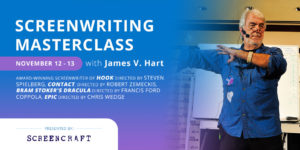Host Ashley Scott Meyers of the Selling Your Screenplay podcast recently interviewed screenwriter James V. Hart, and it's a great conversation packed full of Hollywood stories and screenwriting insights.
Some of our favorite takeaways:
The Writing Process
Ashley: So, let’s talk about your writing process a little bit. ... Approaching material, in terms of outlining, in terms of actually opening Final Draft and writing, how much time do you spend in the preparation phase, outlining, preparing, thinking about it. Versus how much time you’re actually in Final Draft, writing script pages.
James: The last thing I do, the very last thing I do, is hit the screenplay. And by that point, I have outlined, I have charted, I have done treatments, I have done treatments, and treatments, and treatments, and they get longer, and longer, and longer. So when you finally get to the screenplay page, I really try to make that a mechanical process. ... The actual screenplay process, you’re always writing from something you’re adapting, another written page. You’re adapting what you’ve written to a screenplay format. ... Just like going and shooting a film. You don’t just go out and start shooting a movie. You prep it. So, I’ve tried to approach my writing process the way somebody like Francis Ford Coppola approaches prepping to shoot a film. The last thing you do is make the movie. ... I think prep is everything. Research, prep, outline, outline, outline, treatment, treatment, treatment. And now, the charting process I started about 15 years ago that really charts the emotional journey of my characters, for a character-driven narrative as opposed to a plot-driven narrative.
Always Be Writing
Ashley: Even if you don’t have a writing assignment, or something that you’re being paid to write, will you just start writing a spec? Just to keep that routine going?
James: I’m always writing. I mean, in television these days, you better be generating ideas, and you better be coming up with TV projects you want to sell. And if you’re waiting around for an assignment, there’s about 25,000 other people ahead of you. And I’ve always kind of been a self-generator although I do get assignments. But, yeah, I’m never not writing. You need to be working on something, whether it’s your own or somebody else’s, or an idea.
On Using the HartChart
Ashley: Talk about “The HartChart” a little bit. Maybe you can start out just by giving us an overview of what that is?
James: Yeah, thank you. The HartChart was born at the Austin Film Festival and the Equinox writing workshops, about 15 years ago. And, it’s a story mapping tool that actually is a visual graph of the emotional journey each of your characters are going on. Through a series of narrative sign posts, you can actually craft the heartbeat and track the emotional up and down, success and failure of your character. And see it, as opposed to it being cards on a wall. ... And I started it because writers were having a hard time with structure and they would run out of gas on page 30 or 40. And I started the chart to begin to show them where they were succeeding and where they were failing, and where they needed shoring up, and where they needed a paint job, or a flat tire fixed. ... It’s a diagnostic tool. You plug in your car and see what’s wrong with the engine. ... I have directors that have used it, because it’s visual. They actually see on one page their entire film. Where they’re supposed to be emotionally. I have actors who are using it to chart their own character's journey through a script or play that they are doing. ... I think it’s very helpful for threshold writers. Who are maybe having a hard time following McKee, or some of the other kinds of applications that are more text-driven. This forces you to write, this makes you write. And it gives you a chance for you to decide on whether this is good or bad for your character, on what degree is it good or bad, is it progress, is it setback. What is the emotional state my character is in? But you see it, you don’t read it.
Don't miss your chance to study directly with one of the industry's top screenwriters, at the Screenwriting Masterclass with James V. Hart in Los Angeles (November 12 & 13)! Participants will be immersed into Jim’s HartChart story-mapping tool and empathetic “in your shoes” approach to coach writers to develop character-driven, market-ready screenplays.

Tags
Get Our Screenwriting Newsletter!
Get weekly writing inspiration delivered to your inbox - including industry news, popular articles, and more!


























